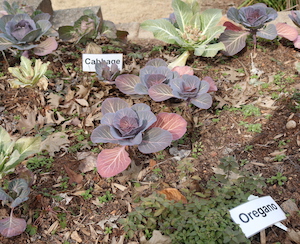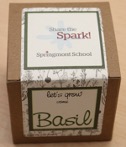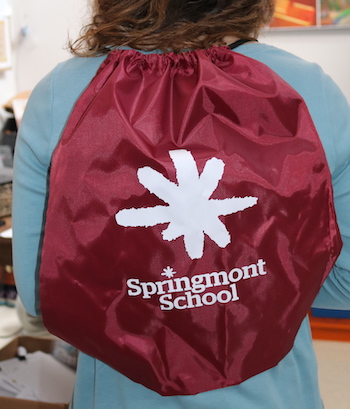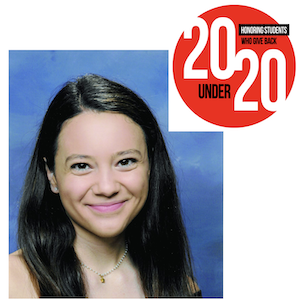News
News
On the Farm: Making Plans for Spring & Summer!

Winter doldrums? More like winter wonders! Winter is the time to dream, plan, and yes, plant! Now is the time to plan that spring/summer garden, map out garden scapes, order seeds, and prepare for the new gardening season.
Planning a new garden doesn’t have to mean a full-scale landscaping project. It can be as simple as designing some new containers for your patio. Container gardening can be a wonderful way to start your garden adventures because really, it’s a small garden! Succulents, cacti, roses, bulbs, small trees, vegetables, you name it, can go in containers. Tomatoes and herbs do particularly well in containers; the only caveat is that you have to be a bit more diligent about watering them as plants dry out faster in containers than they do in raised beds or in the ground.
How you start these mini gardens is up to you. You can always buy seedlings or “starts” at a garden center or, if you’re feeling really adventurous, you can start from seeds! Now is the time to buy your seeds. Most big-box stores sell all the seeds and seed starting supplies you will need, but I particularly like to order from local companies that grow their seeds in our region. Favorites of mine that I use for Springmont's gardens are Southern Exposure Seed Exchange, Sow True Seed, and Baker Creek Heirloom Seeds.
Indoor seed starting can start any time in the winter with a view to planting the seedlings outside after the last frost which, in our area, is predicted for March 23. Your seeds will need heat and light while they are inside. At Springmont, we are lucky enough to have an indoor greenhouse complete with heating pads and grow lights to support the seed’s early growth. Middle School students start seeds during these first few weeks of the second semester. Plants will stay in the small, indoor greenhouse for several weeks and then be moved to the bigger, outdoor greenhouse.
This year, students will be planting with a view to supplying classroom vegetable gardens with seedlings and, with any luck, a spring plant sale. We will be starting tomatoes, peppers, catnip, borage, milkweed, sweetpea, Calendula, Zinnia, eggplant, and summer squash. Later in the spring, students will direct sow corn, squash, and beans.
So, while our outdoor gardens lie quiet, now is a wonderful time to start planning for spring and summer, whether that's a container, raised bed, or backyard garden. Happy planning and planting!
News from the Springmont Parent Association (SPA)

The next meeting of the Springmont Parent Association will take place this Friday, February 4, via Zoom, beginning at 9 am. All parents are members and invited to attend! Use the Zoom link in Springmont Weekly News to join us!
Don't forget, SPA is continuing Springmont's tradition of having students color or create Valentine's Day cards to be delivered to seniors at Legacy Ridge in Marietta. Room Parents have shared information and templates, and finished cards may be brought to school now through Friday morning, February 11.
Reflecting on Montessori and the Work of Dr. King

I grew up in an east-side suburb of Detroit in a community that did not prioritize discussing issues of race, equity, or inclusion. In fact, as I reflect back on my childhood and formative years, I can recall witnessing greater instances of exclusion than inclusion. Among the greatest privileges of belonging to the Springmont community has been the opportunity to learn alongside my children. We took some time around the dinner table last night to discuss the significance of Martin Luther King Jr. Day. It was Joshua who led the conversation of the historical events of Dr. King’s life that had been discussed in his Lower Elementary classroom, while Katherine shared with us about books that had been read to her from our Media Center. While we acknowledged the progress made by Dr. King, we also discussed the need to further his work. I am grateful to be part of a school community that values diversity of all kinds and to know that the Montessori education our children are receiving prepares them to see beyond themselves and want to lead socially useful and purposeful lives. My hope for my own children and all Springmont students is that they will discover their unique gifts and how they can use them to advocate for and serve the needs of others. Each day brings many small opportunities to nurture mutual respect and understanding, both on campus and at home. I am hopeful that our collective efforts will help lead us towards a more equitable, peaceful, and harmonious world.
Share Springmont - Your Good Word Plants the Seeds...

Share Springmont is your chance to tell other parents about how Springmont balances health and safety with academic learning as well as social/emotional well-being. As parents, you know that our highly experienced and caring teachers and our authentic Montessori experience provide children with individualized learning and inspire them to become creative, independent, and globally-minded. Please share your story about our school community - one that respects and embraces diversity of all kinds and believes that inclusivity and mutual respect are essential.
As our Share Springmont campaign continues, we want to thank all those who have helped Share the Spark and encourage you to take a few minutes to help others know that Springmont is Extraordinary by Design!
- Reviewing us on Facebook is easy and fast! Simply visit Springmont’s Facebook page, select Reviews from the menu under the school’s name, and follow the prompts to share your positive experience.
- Are you a member of Nextdoor? If so, we'd love your recommendation! Click here; you will be prompted to leave a comment - kindly select "Show my comment to Anyone" and then the green 'Add recommendation' button.
- You can also review and recommend Springmont on Google, Great Schools, and Niche. Not only do other parents rely on these sites as they select schools for their children, but reviews also affect Springmont's page priority for Google searches.
- Don’t forget to Like us, Follow us, and share Springmont’s Instagram and Facebook posts!
Your Likes, Follows, Reviews, and Recommendations are truly appreciated! They plant the seeds for new families…look for your Share the Spark Seed Box at arrival carpool later this week!
It's a Cinch to Help Springmont!

As part of our Share Springmont campaign, look for staff members handing out these cool new Springmont cinch sacks at arrival carpool later this week!
You can help Springmont by inviting your neighbors, friends, colleagues, and co-workers to join us for one of our Open Houses!
Virtual Open House: Thursday, January 13, 4:30 p.m. (The Zoom link will be shared with those who RSVP.)
On Campus Open House: Sunday, January 23, beginning promptly at 2:00 p.m. (RSVPs requested. Adults only, please)
Helping Children Cope with COVID...again
The Omicron surge is triggering a new round of COVID-induced anxiety, exhaustion, and uncertainty. With increased rates of transmissibility and breakthrough infections, it is understandable that this new wave is creating a sort of PTSD response in many children and adults, as people flashback to the traumatic memories of the beginning of the pandemic nearly 2 years ago. Just when we thought we had seen the worst of things, there is a feeling of “oh no, here we go again.”
According to mental health professionals, the increase in cases during the recent winter holidays may have exacerbated feelings of anxiety or sadness. Holidays often trigger memories of loved ones who have passed, and a new variant may add to anxiety if there is worry about losing more loved ones. With vaccinations, many of us had hoped for a more enjoyable holiday season with less worry about travel, fewer masks, and a brighter outlook for the new year. According to Dr. Leela Magavi, psychiatrist and Regional Medical Director for Mindpath Health, “many individuals perceive the holidays as a new beginning, so the new variant can feel like a regression.”
School closures around the metro area, rising hospital rates for children, and the lack of vaccinations for those under 5, as well as the ever-changing forms of COVID, create a sense of uncertainty regarding the future. If this causes you distress, you are not alone. As humans, we are hard-wired to guard against the possible dangers that come with uncertainty and to seek control. While this is very helpful when assessing potential physical threats (choosing not to walk down a dark alley alone, wearing protective boots when hiking where snakes are known to be in abundance), the threats associated with COVID are often unknown and beyond our control, yet they stimulate the amygdala to react just as if we were confronted with physical danger.
Research shows that uncertainty is felt by children as young as 20 months and that prolonged uncertainty increases anxiety and distress. Most children, particularly those under the age of 12, do not have the coping skills to manage the uncertainty they have experienced over the last two years and look to trusted adults for help. You may be noticing increased anxiety, irritability, forgetfulness, physical symptoms, or an increased need for attention in your child and wonder, how can I as a parent help?
Here are some research-based tips – reminders of things that most of us already know and do but may forget about in moments of stress:
- Remind our kids (and ourselves) that it is completely normal to be worried, even as health professionals share that it is likely Omicron is less severe in how it may be experienced by most children and adults. It can be comforting to know that most people are anxious right now.
- All children, particularly Toddlers and Primary students, are reassured by a calm presence who acknowledges what is happening. For example, parents may comment that “It seems different to eat outside when it’s cold – that’s a way we can help keep ourselves healthy,” when discussing new routines with their children. Simple explanations can reassure children that we notice the changes AND that those changes can lead to a greater good.
- Help children of all ages give names to their feelings. Creative activities such as asking children to draw a picture of what they are feeling can be helpful in providing space for children to express themselves and gain greater mastery of their emotions while also giving adults a window into what the child may be experiencing.
- Model language that includes emotions. “I was feeling scared about Omicron, and it helped me feel less anxious when I realized that wearing better masks will help keep us healthy.”
- Continue routines that are comforting and provide a sense of greater control.
- Help children meditate using smooth stones or other items of visual focus (see Mindfulness for Children at annakaharris.com).
- Plan restorative and enjoyable activities, including outdoor walks, animal time, and sensory-soothing activities.
- Listen carefully. The most important aspect of parenting is the relationship you have with your child. Focus on enjoying the relationship, taking time to play and connect, lowering your expectations on productivity and achievement. Now is the time to be gentle with ourselves.
- Recognize signs that you are stressed (headache, tight chest and throat, neck pain) and attend to your physical symptoms. Your body is deserving of loving care, rest, and restoration. A recent poll by the American Association of Psychiatrists found that parents are among the groups most impacted by the ongoing pandemic, with 86% reporting significant increases in stress.
- Try to avoid catastrophizing (assuming the very worst outcome) or fortune telling (predicting the future). If possible, replace those thoughts with “this will take time” or “I tried this, and it worked before – we can try again tomorrow.” Try to let go of previous standards of productivity, socializing, parenting, and being. Be as understanding and kind to yourself as you would be to your best friend, favorite aunt, or youngest child.
- Remember that “calm” is contagious. Do the things necessary to preserve your energy, even if they may seem selfish, and continue to reach out to those you trust. Remind yourself of the value of what you are doing and how much you, as a caring adult, matter. Breathe. Offer help when you can and ask for help when you need it. Omicron is disappointing, we are tired, and we are strong. We will get through this together, and things will be better.
Springmont Alum Catherine Friedline Named to 20 Under 20 List!

As posted on Springmont's Facebook page earlier this year, Springmont alum Catherine Friedline was featured in the AJC for designing Troop Hope, a Scouting program for girls undergoing long-term medical treatments. This project helped Catherine earn her Gold Award, the highest achievement in Girl Scouting which is completed by only 6% of Scouts, and the Scouts’ highest honor as “Woman of Distinction.”
Recently, The Reporter Newspapers named Catherine one of their 20 Under 20: Honoring students who give back to the community! We couldn't be prouder of this young woman who embodies Springmont's Portrait of a Graduate - determined, resourceful, and socially conscious.


1 day ago
1 weeks ago